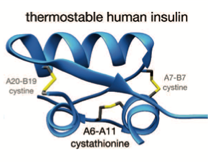Insulin analogue can take the heat
Despite recent advances in the treatment of type 1 diabetes mellitus, storage of insulin therapeutics at 4°C is still necessary to minimise degradation and to preserve biological activity. This can be problematic in poor tropical regions where reliable refrigeration is often not ubiquitous.
To address this issue, a team of medicinal chemists led by Dr Mohammed Akhter Hossain of the Insulin Peptides Laboratory at the Florey Institute of Neuroscience and Mental Health has developed a novel insulin molecule that possesses enhanced thermal stability (Karas J.A., Patil N.A., Tailhades J., Sani M.A., Scanlon D.B., Forbes B.E., Gardiner J., Separovic F., Wade J.D., Hossain M.A. Angew. Chem. Int. Ed. 2016, 55, 14 743–47). Dr John Karas, the lead author of the paper, replaced A6-A11 cystine in insulin with a stable isostere, cystathionine.

This modified analogue was synthesised efficiently and found to be structurally similar to the native hormone. Importantly, both the native binding affinity for the insulin receptor and stability in human serum were maintained. This thermostable insulin has potential as a next-generation therapeutic for type 1 diabetes mellitus.